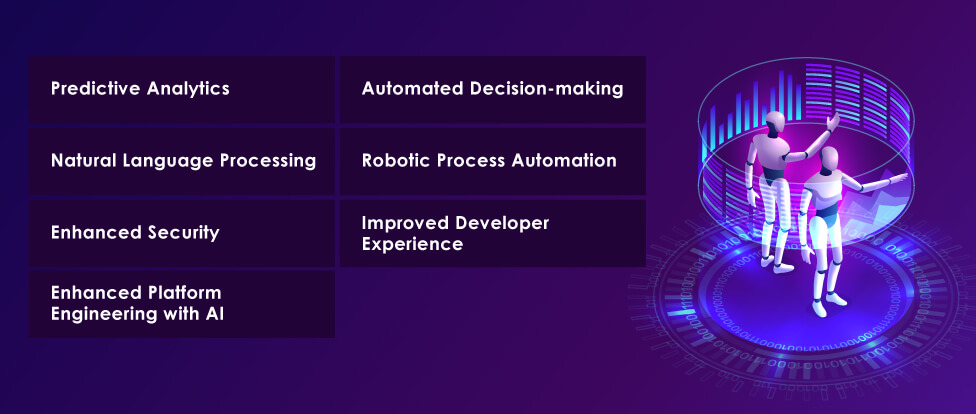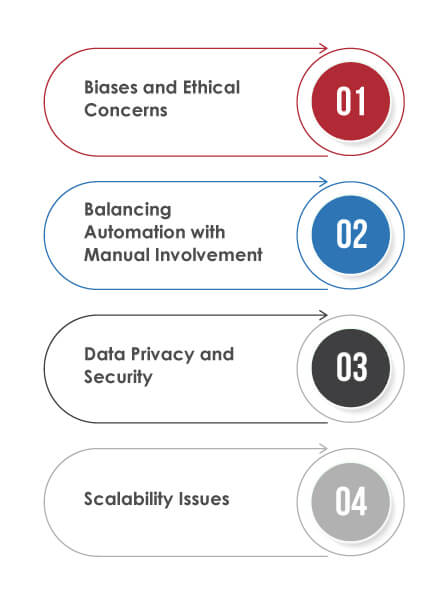Recommended Blogs

How will AI transform Platform Engineering in 2026?
Table of Content
Recently, platform engineering has emerged as a growing trend within IT businesses to establish new structures for software development and operation teams. According to Gartner, 80% of software engineering businesses will have platform engineering teams as internal sources of reusable services, tools, and components for product delivery.
This will help resolve the central problem of cooperation between developers and operators. As businesses adopt cloud technologies, AI in platform engineering will be crucial in handling complexities such as system integrations, performance optimization, technology adaptation, etc., and scaling new tech innovations.
Platform engineering aims to improve business experience and productivity by offering self-service capabilities supported by automated infrastructure operations.
Now, what role is AI playing in this? AI integrations are transforming various technology-driven industries, from finance to healthcare & more. Modern platform engineering is one such tech solution where AI plays a pivotal role. Everyone, from SMEs to large enterprises, wants to stay competitive and keep pace with the evolving digital business environment. AI-powered platform engineering will enable businesses to function more efficiently by automating repetitive tasks, facilitating predictive maintenance, integrating new technologies and processes, etc.
Understanding Modern Platform Engineering
Before starting with modern platform engineering, let us understand “what platform engineering is.” It is an emerging technology approach meant to speed up the application delivery process and improve the value it offers businesses. On the other hand, modern platform engineering involves using next-gen technologies like AI to surpass the constraints of established approaches.
As businesses rely on platforms that allow the development, deployment, and management of apps and services, modern platform engineering acts as a base for delivering value to users, stakeholders, and partners. It relies on automation, agility, and scalability by utilizing modern technologies like microservices, DevOps, and cloud-native practices to achieve deployment efficiency.
As businesses increasingly adopt containerization tools and orchestration platforms like Kubernetes, Terraform, CircleCI, etc., they can easily deploy and manage their large-scale applications.
Role of AI in Platform Engineering
Let’s understand the most recent AI innovation, the “large language model (LLM).” This AI algorithm leverages deep learning techniques and huge data sets to analyze, compress, generate, and predict new content. It can improve the efficiency, consistency, and scale of business processes that require human intervention. Although individual engineers and developers can use ChatGPT, businesses that integrate LLMs within their platform can automate repetitive tasks, improve transparency, and provide real-time support to developers, managers, and platform engineers.
This is just one example of AI in platform engineering. Its practices already involve data analytics, ML applications, and intelligent operations, covering various aspects beyond software engineering and allowing businesses to resolve development lifecycle challenges. It includes automation, monitoring and observability solutions, and much more.
Here’s how AI is upscaling platform engineering:
• AI-driven tools can generate code snippets, entire modules, and IaC scripts. By freeing developers from mundane coding tasks, they reduce human error and accelerate the development process.
• AI technologies can predict where bugs may occur and automate code testing. This QA approach helps identify potential issues early in the SDLC, saving cost, time, and other resources.
• AI enables businesses to monitor complex systems to predict failures before they occur. By analyzing operational data, AI identifies patterns to spot potential issues, allowing businesses to address them swiftly.
• AI-enabled solutions assist businesses in automating infrastructure provisioning, optimization, and configuration. ML algorithms monitor usage patterns, analyze resource demands, and streamline utility settings via dynamic adjustment mechanisms. AI-enabled services are available on platforms like Google Cloud, AWS, and Azure.
• AI improved CI/CD pipeline workflow by automating code analysis, QA, and deployment processes. ML-powered CI/CD platforms can detect defects, predict build outcomes, and recommend optimization options to ensure quality software products are produced and delivered on time.
AI-enabled Platforms Features
AI-enabled platforms offer various features to streamline operations and enhance capabilities within various industries. These platforms leverage AI to automate processes, enhance decision-making, and support predictive insights, allowing businesses to adopt innovation and optimize performance.
Here are some key features of AI-enabled platforms:
Predictive Analytics
These platforms leverage ML models to analyze past data and predict future outcomes. This feature could be crucial for industries like healthcare and finance to facilitate informed decision-making and optimize service delivery.
Automated Decision-making
AI-powered platforms can enable businesses to make decisions in real-time based on data analysis. This would eventually reduce human intervention and increase speed and accuracy in inventory management, customer service, etc.
Natural Language Processing
Leveraging NLP, platforms can understand and interpret human language, like chatbots, that interact with users or tools to extract insights from large text data.
Robotic Process Automation
RPA tools can automate routine tasks like data entry, freeing up teams for more complex and productive work. It will boost efficiency and reduce the error rate related to manual processes.
Enhanced Security
AI algorithms can monitor and analyze network behavior, identify security threats, and respond much quicker than traditional methods. This proactive approach would allow businesses to protect their sensitive data and systems before any new threat attacks their infrastructure.
Improved Developer Experience
One primary function of platform engineering is to enhance the developer experience. An AI-enabled IDP can offer developers programming tools to speed up their work and optimize code quality. It can also free developers from low-priority tasks associated with the no-code interface, facilitating a more streamlined and accelerated SDLC management.
Enhanced Platform Engineering with AI
AI-enabled platforms integrate with microservices, DevOps, and cloud-native solutions to enhance application resilience, streamline DevOps processes, and optimize cloud operations. AI automates scaling and load balancing, predicts deployment outcomes for CI/CD, and enhances security and resource management in cloud-native environments, boosting operational efficiency and flexibility.
Addressing AI-related Challenges in Platform Engineering
As platform engineering integrates with AI, it faces some unique challenges that must be managed efficiently. Businesses should address these challenges to maintain system integrity, security, and functionality to ensure AI-driven solutions are effective and reliable.
Biases and Ethical Concerns
As AI evolves, ethical concerns about algorithm bias and possible misuse will also arise. If the input data is biased, the output will be biased. However, businesses can prioritize fairness by ensuring data sets used during AI model training are unbiased and diverse.
Balancing Automation with Manual Involvement
As AI systems become more complex and integrated with various platforms, ensuring a balance between automation and human involvement is necessary. Uncertainty about technology’s trustworthiness causes business resistance and increases user concerns. This is why businesses, and their platform engineering teams must determine how to work with intelligent systems for the best results.
Data Privacy and Security
With the large volume of data going through organizations, there’s a high risk of security breaches with AI implementation, which could expose private information. Thus, implementing robust security measures like vulnerability assessments and pen testing is becoming important to integrate AI into platforms.
Scalability Issues
AI applications are scalable, requiring more computational resources. Managing these resources efficiently is a significant challenge in platform engineering. Dynamic scaling solutions and efficient resource management strategies can address these issues.
Summary
Platform engineering is evolving with AI integration, enhancing IT operations and collaboration between developers and operators. AI automates essential tasks like coding and system monitoring, boosting efficiency and accuracy.
Features such as predictive analytics and natural language processing streamline operations across various industries, significantly improving decision-making and efficiency.
However, challenges like data privacy, bias, and system security must be addressed to capitalize on AI’s benefits in platform engineering fully. Tackling these issues ensures AI-driven solutions’ effectiveness and ethical soundness, keeping companies competitive in a rapidly digitalizing world.
Why Choose Tx to Optimize Platform Engineering?
Every industry is witnessing the impact of the platform economy, shifting from traditional business models and optimizing the value chain. The best approach would be restructuring your operations with a platform-centered business model. Platforms are built upon the cloud as a foundation and enabler. They grant opportunities across the cloud continuum, including data, AI, and edge computing. The ecosystem-oriented platforms would allow businesses to integrate emerging technologies, forge new partnerships, and broaden opportunities.
Tx’s proven approach to platform engineering can help you build a scalable, seamless, and secure platform that can be optimized for performance and experience.
• We have a team of professionals who are experts in the latest technologies, such as AI, cloud, and microservices.
• With our customized platform engineering, we are speeding up the deployment process while enhancing system security.
• Our in-house accelerators reduce time-to-market, lower development and testing costs, and allow you to focus on core business operations.
• We combine platform technologies, industry, experience, and strategies to transform your enterprise operations.
• Our security testing experts integrate robust security measures into every aspect of platform engineering.
To know more, contact our experts now.
FAQs
Platform engineering is the practice of building and operating an internal platform (often an Internal Developer Platform/IDP) that provides reusable infrastructure, tools, and workflows to help product teams deliver software faster and more reliably.
Tx typically starts with an assessment of your existing CI/CD, IaC, observability, and cloud architecture, then introduces AI capabilities in phases (e.g., AI-assisted code/QA first, then AIOps, then IDP enhancements). This reduces risk while delivering measurable improvements early – like faster releases, fewer incidents, and better developer experience.
-
Low adoption due to poor UX or unclear value
-
Over-engineering and building too much too soon
-
Too many customization paths (hard to support)
-
Weak documentation and enablement
DevOps is a culture and set of practices to improve collaboration and automate delivery between dev and ops.
Platform engineering productizes those practices by building an Internal Developer Platform (IDP) with self-service “golden paths.” This standardizes tooling and workflows across teams and reduces developer cognitive load, making DevOps scalable and consistent.
Discover more



